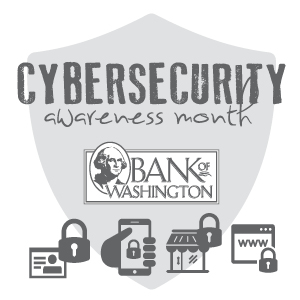Cybersecurity Awareness Month
Bank Offers Consumers Tips To Stay Safe, Secure Online
Published: Wednesday, October 7, 2015
 The Internet is a powerful resource that many Americans have come to depend on for everyday activities like shopping, banking and connecting with friends.
The Internet is a powerful resource that many Americans have come to depend on for everyday activities like shopping, banking and connecting with friends.
“At the Bank of Washington, we embrace technology. The information it provides and the conveniences it offers is advantageous to everyone,” said Louis B. “Buzz” Eckelkamp III, president.
“We also know it can make users vulnerable to fraud, identity theft and other scams,” he said. “This is why we are taking the opportunity to teach users how to help protect themselves.”
In recognition of National Cybersecurity Awareness Month, the Bank of Washington offers the following tips to help consumers stay safe and secure online:
- Keep your computers and mobile devices up to date. Having the latest security software, Web browser and operating system are the best defenses against viruses, malware and other online threats. Turn on automatic updates so you receive the newest fixes as they become available.
- Set strong passwords. A strong password is at least eight characters in length and includes a mix of upper and lowercase letters, numbers and special characters.
- Watch out for phishing scams. Phishing scams use fraudulent emails and websites to trick users into disclosing private account or login information. Do not click on links or open any attachments or pop-up screens from sources you are not familiar with.
- Forward phishing emails to the Federal Trade Commission (FTC) at spam@uce.gov – and to the company, bank or organization impersonated in the email.
- Keep personal information personal. Hackers can use social media profiles to figure out your passwords and answer those security questions in the password reset tools. Lock down your privacy settings and avoid posting things like birthdays, addresses, mother’s maiden name, etc. Be wary of requests to connect from people you do not know.
- Secure your Internet connection. Always protect your home wireless network with a password. When connecting to public Wi-Fi networks, be cautious about what information you are sending over it.
- Shop safely. Before shopping online, make sure the website uses secure technology. When you are at the checkout screen, verify that the Web address begins with https. Also, check to see if a tiny locked padlock symbol appears on the page.
- Read the site’s privacy policies. Though long and complex, privacy policies tell you how the site protects the personal information it collects.
This area has been victim of a few large phishing scams in the past, which can happen through phone calls, text messages or email.
“The biggest thing to remember about phishing is that if we are contacting a current customer about their account, we will never ask for their full identification information, such as an entire Social Security number. We already know that information,” Eckelkamp said. “We always advise the community to never give out personal information to anyone that you have not initiated contact with first.”
The Bank of Washington will be running a campaign throughout the month of October to help bring awareness to these and other cyber safety tips. People can also visit www.bankofwashington.com/cybersecurity for information.



